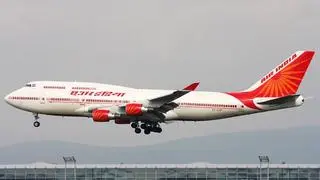It’s usually the last shopping stop on a visit abroad — to buy a gift for a friend whose name had somehow missed the initial list or even to get a good deal on some fine liquor. Whatever the reason, duty-free shops are now a favourite stop of the air traveller.
But it is not exactly true for the ones in India. Duty-free shops at Indian airports are usually not as glamorous as their counterparts in places like Dubai or Singapore. The shops — located in a corner with four or five cigarette brands, some alcohol and a few chocolates — would be conspicuous for the wrong reasons. And then there was the issue of the missing global brands.
One company is trying to change this perception. Flemingo, which has the largest network of duty-free shops in the country, has slowly worked on overcoming constraints of space and attitudes to make a mark in this niche sector.
Set up in 2003 with duty-free shops in four airports, the company has expanded to 11 airports and eight seaports. Its duty-free outlets can be found in Chennai, Kolkata, Goa, Tiruvanathapuram, Kozhikode, Mangaluru, Trichy, Amritsar, Jaipur, Lucknow, and Ahmedabad airports. It has shops in the Mumbai, Haldia, Paradip, Goa, Kolkata, JNPT, Mangaluru and Mundra seaports. Flemingo also manages — along with its partner DFS — Mumbai Duty Free, the largest duty free area in the country, totalling some 50,000 sq ft.
Atul Ahuja, Group CEO of Flemingo, says duty-free retail in India has evolved since the days his company began operations. The customer profile has changed from being mostly business travellers to affluent middle-class Indians going overseas for a holiday.
A part of the Dubai-based $600 million Flemingo International, which has a presence in 32 countries, Fleming India has revenue of around $60 million and is annually growing at 8-12 per cent. LS Travel Retail, Heinemann and Aer Rianta are some of its global rivals.
Ahuja says the discerning Indian consumer has a taste for premium merchandise and Flemingo has been trying to fulfil that demand through its new stores.
There is huge demand among Indians for imported liquor, chocolates and perfumes. And most of the time, the perception is that you get the best deals abroad. For instance, Jayaraj George, a resident of Chennai, says the first question his friend N Kumaran asked him after a trip abroad was if he had bought for him the promised Black Label whisky from Dubai duty free.
Anirban Dutta Chowdhury, CEO of Flemingo Dutyfree Shop Pvt Ltd, says people like Kumaran may not be aware that the whisky costs the same in Indian and international duty-free shops. This is because duty-free shops are exempt from the payment of local taxes and duties. If a Johnnie Walker Black Label is available at $29 in the Chennai airport duty free shop run by Flemingo, it will be the same price in Dubai or Singapore.
While the shops at Indian airports are no match to the ones in Dubai or Singapore in size, they are doing well because of the growth in passenger traffic. “Our growth will depend on the increase in air passenger traffic,” says Chowdhury. “A lot of people perceive that duty-free shops at larger airports are cheaper. This is incorrect. The biggest challenge is to change this perception.” Chennai airport’s Director Deepak Shastri says shops with good aesthetics will appeal to travellers and give them a ‘world class’ retail environment. Chennai airport will double the space available for the existing store, hoping to increase the sales.
Another misconception is that the range is better abroad, he says. "This is also not correct because duty free as an industry revolves around a few set products. It is the same thing that one buys across the world."
For example, Black Label, Toblerone and KitKat account for the major chunk of the sales at most duty-free shops. However, if a passenger is looking for a particular type of cigar, the shop in Chennai airport may not have it.
Revenue-share modelHowever, the issue of space is being addressed by the Airports Authority of India. For instance, the Chennai airport has increased the space nearly 2.5 times to 5,000 sq ft for duty-free. “This will help us bring the best of global brands. More global brands will occupy the shelves,” says Chowdhury.
More importantly, “we have moved from a landlord and tenant kind of relationship to a revenue-share model in the new tender. This makes AAI partners in our venture,” he says. The revenue share ranges from 36 to 43 per cent for AAI, says Chowdhury. The revenue-share model works for Flemingo as it has to pay the landlord a part of the actual sales, which fluctuates every month, instead of a flat amount.
In the past two months, Flemingo has started putting its products online for customers. It cannot deliver them to their door-step as they are Custom bonded.
However, one can book online and collect the items at departure or arrival on producing the passport and boarding pass. “The kind of growth we have seen in online shopping is humongous,” says Chowdhury. The average ticket size on its website is five times more than the in-store purchases.
The duty free shop industry in India is valued at around $500 million while globally it is around $60 billion. The industry is very fragmented but a lot of consolidation is happening globally, says Chowdhury.
“We compete with duty-free shops in Dubai and Singapore and need to constantly keep track what’s going on there and change our offerings accordingly. For instance, any fluctuation in Malaysian Ringit will have a bearing on us,” he says. “We strive to offer better deals and keep our prices competitive.”







Comments
Comments have to be in English, and in full sentences. They cannot be abusive or personal. Please abide by our community guidelines for posting your comments.
We have migrated to a new commenting platform. If you are already a registered user of TheHindu Businessline and logged in, you may continue to engage with our articles. If you do not have an account please register and login to post comments. Users can access their older comments by logging into their accounts on Vuukle.